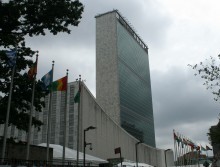
The United States on Friday wielded their veto power to prevent a demand by the United Nations Security Council for an unconditional ceasefire in the Gaza conflict, slamming the resolution as hypocritical and risking more conflict in the future. US Deputy Ambassador to the UN Robert Wood, in comments published by the US Mission to the UN, called the resolution’s demand for an unconditional ceasefire “not only unrealistic but dangerous.”
“It would simply leave Hamas in place, able to regroup and repeat what it did on October 7,” said Wood, referencing the Hamas massacre of 1,200 Israelis and kidnapping of hundreds more that started the conflict. “Colleagues, a senior Hamas official recently stated the group intends to repeat the vile acts of October 7, ‘again and again and again.’ And yet, this resolution essentially says Israel should just tolerate this. That it should allow this terror to go unchecked.
“That’s not tenable. It’s not realistic. And it’s a recipe for disaster—for Israel, for the Palestinians, and for the entire region.”
While the resolution did call for the unconditional release of the more than 100 hostages still held by Hamas, Wood noted that it failed to condemn the atrocities committed by Hamas on October 7, failed to demand that the International Committee of the Red Cross be given immediate access and provide medical treatment to the hostages, and failed to recognize Israel’s right to defend itself against terrorism. In spite of all this, 13 of the Security Council’s 15 members voted for the resolution—which was sponsored by the United Arab Emirates—while the UK abstained.
Israeli Prime Minister Benjamin Netanyahu expressed his great appreciation for the “correct” stance taken by the US at the UN’s most powerful body, while also decrying the incoherent approach of other nations. “The other countries need to understand that, on the one hand, it is impossible to support the elimination of Hamas while, on the other hand, calling for a halt to the war, which will prevent the elimination of Hamas,” said Netanyahu in comments translated from Hebrew and published by Israel. “Therefore, Israel will continue our just war to eliminate Hamas and achieve the other goals of the war that we have set.”
The UN vote followed the unusual use of Article 99 by UN Secretary-General António Guterres to call an emergency meeting of the Security Council due to threats to international peace and security. The last time the United Nations records show Article 99 was formally invoked was in 1989 during the Lebanon conflict—having not been used for the Rwandan genocide, the first or second Iraq war, the 9/11 terror attacks and subsequent war in Afghanistan, nor in the Russian invasions of Georgia or Ukraine.
Guterres justified his use of the rare move by claiming “devastating” consequences from the conflict, including humanitarian concerns, according to a summary of his comments posted to the UN website. Despite repeated evidence of Hamas using civilian locations such as hospitals, mosques, schools and homes as command centers, weapons storage and entrances for terror tunnels, Guterres effectively dismissed Hamas’ use of their own people as human shields. In half a sentence, he merely said the Hamas use of human shields is “in contravention of the laws of war” and said it “does not absolve Israel.”
Israeli Ambassador to the UN Gilad Erdan on Saturday condemned Guterres’ approach to the conflict in a post to X (formerly Twitter). “A Secretary General who does not really condemn terrorism and who does not really work for the release of children and women kidnapped by terrorists—is not worthy of his position,” said Erdan in comments translated into English from Hebrew by Google.
“A Secretary General who does not support a democratic country fighting against a murderous terrorist organization is a morally depraved Secretary General who should not have one more minute in his position. I will continue to expose the hypocrisy and double standards of the Secretary General.”
Meanwhile, Israeli diplomacy has continued the strong tone. Netanyahu spoke with leaders of France, Germany and others to highlight the inconsistency of wanting Hamas removed and the war to also end prematurely, according to one Israeli press release, while issuing unusually strong criticism in a call to Russian President Vladimir Putin. Per a recap of the Russia call published by Israel, Netanyahu “expressed his dissatisfaction with the positions expressed against Israel by Russian representatives at the UN and in other forums” and “sharp criticism of the dangerous cooperation between Russia and Iran.”
Said the Israeli press release, “The Prime Minister emphasized that any country that had been struck with a criminal terrorist assault such as Israel experienced would have reacted with no less force than Israel is using.”
In the end, the inconsistent approach to Israel’s right to self-defense was highlighted by the Americans at the UN as well. “No country could or should tolerate what Hamas did on October 7,” said Wood. “If any of our own countries had been attacked in this way, we would all expect this Council to reaffirm our right to protect our citizens.”
And if a ceasefire is achieved without change in Gaza, Wood warned the next conflict is already primed.
“As long as Hamas clings to its ideology of destruction, any ceasefire is at best temporary and is certainly not peace. And any ceasefire that leaves Hamas in control of Gaza would deny Palestinian civilians the chance to build something better for themselves,” said Wood.
“For that reason, although the United States strongly supports a durable peace in which both Israelis and Palestinians can live in peace and security, we do not support this resolution’s call for an unsustainable ceasefire that will only plant the seeds for the next war.”
(By Joshua Spurlock, www.themideastupdate.com, December 10, 2023)
